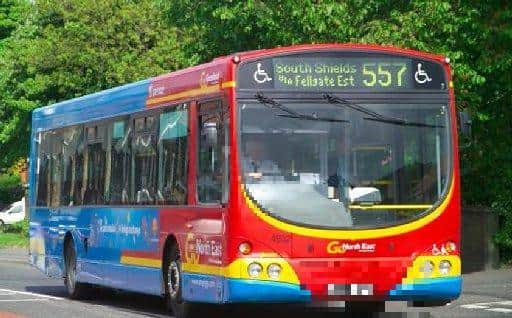Staff shortages and sickness behind bus cancellations and delays, say transport chiefs as they vow they are working hard to tackle problems
and live on Freeview channel 276
Bus company Go North East said cancellations are one of the “biggest problems” they face and it is down to a “shortage of staff” for various reasons.
Graham Hill, Go North East network design manager, said it is an issue impacting similar organisations, along with different sectors, across the country.
Advertisement
Hide AdAdvertisement
Hide AdHe said: “There is a shortage of bus drivers there which is why a number of services are being cancelled at short notice


“Whether that’s through people leaving for other jobs or through health reasons, either through self isolation or through being on long-term sick because of operations that have been postponed, and the NHS is now catching up.
“We’ve tried to be really proactive and try to get the information out to say which journeys are being cancelled, we’re trying to do that for a good reason, so that information is there so you can try and plan around which journeys are cancelled.”
The updates were provided at the latest meeting of Hebburn Community Area Forum (CAF) at Hebburn Central.
Advertisement
Hide AdAdvertisement
Hide AdMr Hill noted they do their best to reduce cancellations by moving staff around depots and increasing overtime payments to encourage drivers to take extra shifts.
He added in recent weeks cancellations have reduced, especially in comparison to the high rates seen in January that coincided with a wider spike in Covid-19 cases and more people needing to isolate.
He said: “I completely 100% understand the inconvenience that those short-notice cancellation cause and I can only apologise for anybody who has encountered those problems.
“We always try and make sure first buses run, last buses run, and if a bus is cancelled the bus before it and the bus after it also run.
Advertisement
Hide AdAdvertisement
Hide Ad“We always try our best to do that wherever possible, there might be the odd situation that happens where two buses in a row will be cancelled, but we always try our best and the list everyday is reviewed.”
An update was also provided on how bus passenger numbers are at “about 80%” of their pre-Covid levels, after previously dropping to as low as 10% when lockdown first began.
However it was noted bus services are now back running at 100% of what they were previously, meaning long-term issues could be faced if passenger rates do not return to their previous numbers.
Mr Hill added: “That obviously presents a really difficult challenge for the sustainability of bus services in the future.
Advertisement
Hide AdAdvertisement
Hide Ad“This is the problem across the country, the same for trains, bus, metro, not just in the North East, but everywhere.
“In the future there’s going to have to be a lot of conversations around what buses actually do, how they run, where they run.”
It was revealed earlier this month by the Department for Transport a Bus Service Improvement Plan for the North East had won more than £163million of Government backing for the next three years.
Around £74million will be for capital projects, including improving bus infrastructure, with just under £90million for issues such as improved fares and services.
The allocation is lower than the original £804million proposal the North East bid for in 2021, however.